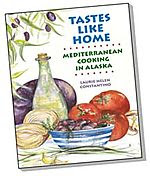For Alaskans tired of the monotonous winter landscape, a quick trip to Vancouver Island, British Columbia provides great relief. It is vibrantly green, punctuated by spectacular ocean vistas, and easily accessible from Seattle via high-speed ferry.
Several years ago, I took a spring trip to Vancouver Island with my sister. We visited wineries, ate delicious food prepared by creative chefs, and enjoyed the sun as we randomly walked and drove country roads.
While in Victoria, the Island’s main city, we reminisced about our annual visits there as kids. We talked our way into the motel room where our family always stayed and laughed about lemon curd on toast; a taste treat we associate with the Island.
In recent years, artists and wineries clustered in the Island’s Cowichan Valley have attracted a new wave of visitors. Cowichan, a First Nation word meaning “land warmed by the sun,” has a micro-climate well-suited for growing grapes. The wines we tasted were surprisingly good.
Hilary’s Cheese on Cherry Point Road was one of the trip’s highlights. Because we were there off-season, Hilary had time to give us a tour of his cheese making facilities. He explained his production methods and gave us tastes of wonderful Trappist and Camembert-style cheeses.
At Hilary’s, in addition to cheese, I bought a jar of dukkah (or duqqa), a Middle Eastern spice and nut mix I learned about from my Egyptian friend Nawal. When I interviewed Nawal for Tastes Like Home: Mediterranean Cooking in Alaska, she told me to dip bread in olive oil and then in dukkah. I followed Nawal’s instructions with the dukkah I bought from Hilary’s, and immediately enjoyed the combination.
Judging from Internet ads, dukkah is quite popular in Australia, though I’ve never seen it sold in Alaska. So when my Canadian dukkah was gone, I investigated how to make my own. I studied Nawal’s recipe, went through my cookbooks, and researched dukkah online. I discovered there are as many recipes for it as there are cooks.
Any kind of nut is fine for dukkah; hazelnuts or almonds are frequently used. Sesame, coriander, cumin, and black pepper are in most dukkah recipes, but the proportions of each vary widely. Some recipes include mint, thyme, red pepper, turmeric, caraway, cinnamon, or clove.
It took me three tries before I came up with a combination I loved. After finalizing the recipe, I found myself grabbing pinches of dukkah for a mid-afternoon snack and using it to perk up simple roast vegetables. Dukkah is amazingly addictive and versatile.
 Dukkah
Dukkah
Makes 1 cup
To eat Dukkah like an Egyptian, follow Nawal’s instructions and dip bread in oil and then in Dukkah. You can also mix Dukkah and olive oil for an easy, last-minute appetizer. Dukkah is good on potatoes, hard boiled eggs, roasted vegetables, or sprinkled over a plate of feta cheese, fresh tomatoes, and sliced cucumbers. Fish, chicken, and lamb all benefit from a dusting of Dukkah. The spice combination in this recipe is my own; the technique for roasting nuts and spices was adapted from Rose Levy Berenbaum.
1/2 cup unblanched almonds
1/4 cup sesame seeds
2 Tbsp. cumin seeds
2 Tbsp. coriander seeds
1 Tbsp. black peppercorns
1 tsp. salt
1 tsp. sugar
Preheat oven to 325°F.
Put almonds on a baking sheet. Put the sesame seeds, cumin seeds, and coriander seeds in three separate oven-proof baking cups, and put the cups on the baking sheet. Roast the cumin seeds for five minutes, the coriander seeds for seven minutes, and the almonds and sesame seeds for 10 minutes.
Grind the black peppercorns, cumin seeds, and coriander seeds in a spice grinder until they are roughly ground (or you can pound them in a mortar and pestle). Put in a bowl large enough to hold all the ingredients. Grind the sesame seeds and then the almonds until roughly ground and add to the bowl (the almonds should be slightly chunky). Add the salt and sugar.
Mix all the ingredients together. Store in the refrigerator or freezer.
 Roast Cauliflower with Dukkah
Roast Cauliflower with Dukkah
Serves 2 as a main course or 4 – 6 as an appetizer
Dukkah goes particularly well with the slightly nutty flavor of roast cauliflower.
1 pound cauliflower florets
1/2 tsp. salt
1/3 cup olive oil
2 – 4 Tbsp. dukkah
Preheat oven to 500°F.
Wash and dry the cauliflower and break or cut it into florets. Place the cauliflower florets in a baking pan large enough to hold them in a single layer. The cauliflower should not be jammed together in the pan or it will steam rather than cook properly. Season with salt and drizzle with olive oil. Sir well to coat the florets evenly.
Roast for 10 -1 5 minutes, or until the cauliflower begins to brown. The length of cooking time depends on the size of the cauliflower florets, and how soft you like cauliflower. Since I like roast cauliflower a little crisp, I generally cook it for the shorter time.
When the cauliflower is done, sprinkle with 2 Tbsp. dukkah and stir to evenly distribute. Taste and add more dukkah, as desired.
 Falafel (Φαλάφελ ή Ρεβυθοκεφτέδες)
Falafel (Φαλάφελ ή Ρεβυθοκεφτέδες) Dukkah
Dukkah Roast Cauliflower with Dukkah
Roast Cauliflower with Dukkah

